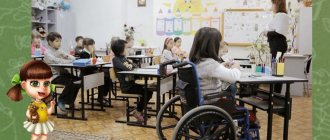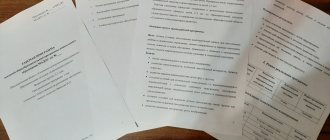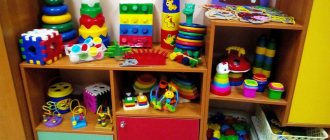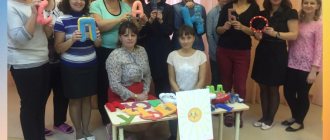Organization of joint work between a teacher-psychologist and a speech therapist in a preschool institution
Vera Reznikova
Organization of joint work between a teacher-psychologist and a speech therapist in a preschool institution
In our kindergarten, much attention is paid to correctional and developmental work with children who have various disabilities in the cognitive and speech spheres, the number of which is increasing every year. Speech correction is carried out by therapist teacher , but to make this work more effective, other specialists should be involved in this process. Who else but an educational psychologist can become a worthy partner in overcoming speech disorders in children of speech pathologists.
the complementarity of the positions of a teacher-psychologist and a teacher-speech therapist in the approach to a child , close cooperation in all areas of work as a necessary condition for ensuring effective work on the full development of the child’s personality, preserving and strengthening his physical, mental and moral health. The objectives of speech therapy work are reduced to social adaptation and integration of a child with a speech disorder into the environment of normally developing peers. Successful implementation of these goals is possible only with close interaction between these specialists in development (correction)
speech and non-speech mental processes and functions.
A speech therapist and a psychologist pursue different goals in their work , but the ways and means of achieving them quite often turn out to be common. It must be taken into account that there is always a group of children who equally need the help of both specialists.
Planning and implementation of correctional and developmental interventions requires the interaction of a speech therapist and a psychologist in cases where the following problems underlie the difficulties of teaching and raising a child:
• unformed HMF is combined with insufficient speech development;
• speech impairment is accompanied by maladaptive anxiety;
• speech underdevelopment is accompanied or causes a decrease in educational motivation and self-control.
The work of a speech therapist within the framework of integration may include the following:
• Development of the sound side of speech.
• Development of vocabulary and grammatical structure of speech.
• Formation of coherent speech.
• Formation of full-fledged educational skills.
The work of a psychologist in conditions of integration may include the following:
• Development and correction of higher mental functions.
. Activation of cognitive activity.
. Creating an environment of psychological support for children with speech disorders.
. Development of memory, attention, thinking.
. Development of arbitrariness and self-control skills, strong-willed qualities.
. Activation of practiced vocabulary .
We believe that cooperation should begin at the initial stage, as soon as the speech therapist and psychologist have studied the medical records of the children at the time of staffing the speech therapy groups.
Based on the data, individual psychological and pedagogical characteristics are compiled for submission to the PMPK. An educational psychologist must be present at the PMPK meeting in order to perform two functions: “security”
(explanation of any situation that requires the competence of a psychologist for a given child) and diagnostic (through the method of observing a child in a new situation, the emotional-volitional sphere is diagnosed, which gives a complete picture of the levels of development of the emotional, intellectual and communicative spheres of the child at the same time).
Thus, even before children enter speech therapy groups, it is possible to obtain all the necessary information on children-speech therapists to draw up their socio-psychological portrait, determine the ways and forms of assistance, as well as select the means and forms of support.
After the planned diagnosis of children, a joint meeting . The data obtained make it possible to establish the degree of violation of the psychological characteristics, health status, and compensatory capabilities of a preschooler , and to outline the route of individual development of each child.
An important stage of the work and a psychologist could use in their work
For example, it is reasonable to systematize tasks for the development of memory, thinking, attention, and perception using specially selected lexical material aimed at automating a specific sound.
We can distinguish the following forms of work that reflect the interaction between a teacher-speech therapist and an educational psychologist in kindergarten :
– conducting and discussing diagnostic results ( a speech therapist examines speech , a teacher-psychologist examines cognitive processes, and the level of development of the cognitive sphere);
– correctional and developmental classes (in speech therapy classes, techniques are used to activate mental processes, and in the classes of a teacher-psychologist, children’s speech is activated);
– integrated activities with children;
– parent meetings, trainings for parents, consultations, poster information covering issues of psychology and speech development.
Thus, the organization of interaction between a teacher-speech therapist and an educational psychologist to accompany children in need of speech therapy help allows solving a number of problems:
— Ensuring the integrity and unity of the correctional and developmental space in the content and correctional plans;
— Implementation of full-fledged professional interaction in the pedagogical process ;
— Updating the forms and content of correctional work with children ;
— High professional level and creative nature of teachers’ .
The relationship between the work of a speech therapist and a psychologist is not limited to the use of correctional psychological and speech therapy forms and methods in the classroom; mutual integration is much deeper. It involves joint planning and conducting classes, drawing up general plans for correctional work with children requiring increased pedagogical attention , joint monitoring based on the results of examinations and correctional and developmental activities, developing recommendations for teachers and parents on issues of mental and speech development of children, designing visual propaganda for teachers and parents , selection of literature for their self-education.
A speech therapist and a psychologist deal with the development of speech and other mental processes at the same time, but not on equal terms. The main task of a speech therapist is speech development , and correction of higher mental functions contributes to this. Speech development for a psychologist is also one of the main tasks, but in the context of work , speech is a means of developing intelligence.
Teacher-psychologist : Reznikova V. A.
In approaching the child, we consider close cooperation in all areas of work as a necessary condition for ensuring the effective work of the psychological and speech therapy service in kindergarten.
The main function of an educational psychologist
in a preschool educational institution is the creation of conditions conducive to:
- protecting the physical and mental health of children,
- ensuring their emotional well-being,
- free and effective development of the abilities of each child.
Clinical and psychological-pedagogical examination of children with speech disorders reveals in many of them characteristic deficiencies in the development of the cognitive sphere, caused by speech defects and low mental and physical performance.
L.S. Vygotsky wrote: “A defect in some analyzer or intellectual defect does not cause an isolated loss of one function, but leads to a whole series of deviations.”
.
That is, there are no speech disorders in which,
due to intersystem connections,
other psychological disorders would not be noted
. Together they form a complex psychological profile of deviations in mental development in children, in the structure of which one of the leading syndromes is speech disorders.
Children in speech therapy groups with normal intelligence often experience a decrease in cognitive activity and the processes included in its structure:
- less volume of memorization and reproduction of material,
- instability of attention,
- quick distraction
- exhaustion of mental processes,
- reduction in the level of generalization and comprehension of reality;
- They have difficulty developing coherent speech.
From the emotional-volitional sphere, a number of features are also observed:
- increased excitability,
- irritability or general lethargy,
- isolation,
- touchiness,
- tearfulness,
- repeated mood changes.
The need for a comprehensive and thorough study of the organizational and content aspects of speech therapy assistance for children, strengthening its preventive aspects is currently an urgent need and task of preschool education.
The purpose of cooperation between a speech therapist and an educational psychologist is
in our kindergarten is:
- creating a model of interaction in the process of correctional and developmental educational activities that stimulates the speech, cognitive and personal development of the child.
- ensuring the integrity and unity of the correctional and
developmental space in terms of content and organization.
Formation of groups
Work with children begins in advance, even before speech therapy groups are formed. These groups include children with speech defects, mainly from the mass groups of our institution. Therefore, we already have certain information about the personal characteristics of the development of each child applying for speech therapy groups, from previously conducted diagnostics of the previous age stage.
Children with speech defects are examined in depth not only by a speech therapist, but also by a teacher-psychologist using the methods of M.M. Semago, as well as N.N. Pavlova, L.G. Rudenko.
Based on these data, individual psychological and pedagogical characteristics are compiled for submission to the PMPK.
The educational psychologist must be present at the meeting of the PMPK in order to perform two functions:
- “security” (explanation of any situation that requires the competence of a psychologist for a given child)
- diagnostic (through the method of observing a child in a new situation, the emotional-volitional sphere is diagnosed, which gives a complete picture of the levels of development of the child’s emotional, intellectual and communicative spheres at the same time).
Thus, even before children enter speech therapy groups, we have all the necessary information on children-speech therapists to draw up their socio-psychological portrait, determine the ways and forms of assistance, as well as select the means and forms of support. The exception is for newly arrived children from other preschool institutions or families. Therefore, at the beginning of the school year, these children are examined first. After the planned diagnosis of children, a joint meeting is held. The data obtained make it possible to establish the degree of violation of the psychological characteristics, health status, and compensatory capabilities of the preschooler, and to outline the route of individual development of each child.
Working with parents
Successful overcoming of speech underdevelopment depends not only on the close and coordinated work of an educational psychologist and speech therapist, but also to a greater extent on the relationship with parents.
Therefore, in this direction, the educational psychologist conducts:
- educational work,
- consultations,
- design of information stands.
General questions are brought up at parent meetings, and private questions, as well as familiarization of parents with the diagnostic results and the plan of work with the child, are carried out in the form of individual consultations and conversations.
The effectiveness of all correctional work carried out by specialists will only increase if parents themselves master specific games, developmental technologies, and effective forms of helping their child.
The selection of correctional programs and methods for children is carried out by a teacher-psychologist based on diagnostic results. The frequency of developmental classes is usually 1-2 times a week, depending on the child’s needs. We believe that a close relationship between a teacher-speech therapist and an educational psychologist can be possible subject to joint planning of work, with a correct and clear distribution of tasks for each participant in the correctional educational process.
The content of the work of the joint plan of the teacher-speech therapist and educational psychologist is divided conditionally into three periods (in accordance with the program for speech groups in kindergarten) and is carried out taking into account all forms of interaction: with children, teachers and parents (Appendix No. 1, Appendix No. 1)
.
Thus, we highlight such forms of work that reflect the interaction between a teacher-speech therapist and an educational psychologist in our kindergarten:
- conducting and discussing diagnostic results (the teacher-speech therapist examines speech, the educational psychologist examines cognitive processes, and the level of development of the cognitive sphere);
- correctional and developmental classes (speech therapy classes use techniques to activate mental processes, and in the classes of a teacher-psychologist, children’s speech is activated);
- integrated activities with children;
- parent meetings, trainings for parents, consultations, poster information covering issues of psychology and speech development.
Diagnosis of the emotional sphere and cognitive sphere of preschoolers is carried out jointly. We have drawn up an examination plan, the data of which we enter into a special development card for the pupil.
Appendix No. 1
Joint work plan of a speech therapist and educational psychologist
Time spending
| Interaction with teachers Target : Creation of a single correctional and developmental space | Interaction with children Target : Establishing the causes, structure and severity of deviations in their speech development and their correction. | Interaction with parents Target: Establishing cooperation (establishing joint requirements for the general and speech education of the child) | |
| 1st period (September – November) | Development of a joint diagnostic block of techniques. Conducting a psychological, medical and pedagogical consultation (PMPC) based on the results of the diagnosis. Drawing up a calendar-thematic plan for correctional work. | Conducting diagnostics: the level of development of the emotional sphere, the development of cognitive processes, speech development. Mapping child development. Correctional and developmental classes: speech therapy with children, correction of cognitive processes in children. Integrated classes (teacher – speech therapist + educational psychologist) | Parent meeting “Let’s get to know each other” Parent meeting “Diagnosis results and learning objectives for the school year.” Consultation “Creating a speech environment in the family.” |
| 2nd period (December – March) | Conducting PMPK. Discussion of the results of correctional and developmental work with children during the first period of study. Consultation “Development of emotional vocabulary.” | Correctional and developmental classes with a speech therapist and educational psychologist. Intermediate diagnostics of children's speech development (teacher-speech therapist). Cognitive development (educator-psychologist). Individual lessons on the development of the emotional sphere. Integrated classes (teacher-speech therapist + educational psychologist). | Parent meeting “Developing a child’s speech.” Consultation “World of Emotions”. |
| 3 period (March-May) | Conducting PMPK. Discussion of the results of correctional and developmental work with children during the school year. | Cor.-Development classes with a speech therapist and educational psychologist. Carrying out diagnostics (educator-psychologist, teacher-speech therapist). Integrated classes (teacher-speech therapist + teacher-psychologist). | Parent meeting “Results of re-diagnosis”. Parent meeting “Recommendations for the summer period” |
Appendix No. 2
Calendar-thematic plan for the correctional work of a speech therapist and educational psychologist
| date | Subject |
| September 3rd week | "Vegetables. Garden" |
| September 4th week | "Garden. Fruits" |
| October 1st week | "Garden Garden" |
| October 2nd week | "Trees" |
| October 3rd week | Forest. Mushrooms. Berries |
| October 4th week | |
| November 1st week | "Autumn" |
| November 2nd week | "Man, body structure" |
| November 3rd week | "Toys" |
| November 4th week | "Dishes" |
| December 1st week | "Food" |
| December 2nd week | "Winter" |
| December 3rd week | "Wintering Birds" |
| December 4th week | "New Year" |
| January 2nd week | "Cloth" |
| January 3rd week | "Shoes" |
| January 4th week | "Hats" |
| February 1st week | "Wild Animal" |
| February 2nd week | "Pets" |
| February 3rd week | "Transport" |
| February 4th week | "Our Army" |
| March 1st week | "Furniture" |
| March 2nd week | “March 8th is the holiday of mothers and grandmothers” |
| March 3rd week | "Spring" |
| March 4th week | "Migratory birds" |
| April 1st week | "Professions" |
| April 2-week | "Tools" |
| April 3rd week | "House. Family" |
| April 4th week | "Fish" |
| May 1st week | "Victory Day" |
| May 2nd week | "Flowers" |
| May 3rd week | "Insects" |
| May 4th week | "Seasons" |
MAGAZINE Preschooler.RF
Partnership interaction between a psychologist, speech therapist and parents at the State Budgetary Educational Institution for children with speech pathology- E. Yu. Tsaregorodtseva teacher-speech therapist,
- S. O. Vasilyeva, educational psychologist
GBDOU kindergarten No. 11 of compensatory type Kalininsky district of St. Petersburg
Children in speech therapy groups with normal intelligence often experience a decrease in cognitive activity and the processes included in its structure: less memorization and reproduction of material, instability of attention, rapid distractibility, exhaustion of mental processes, decreased level of generalization and comprehension of reality; They have difficulty developing coherent speech. From the emotional-volitional sphere, a number of features are also observed: increased excitability, irritability or general lethargy, isolation, touchiness, tearfulness, repeated mood changes.
The need for a thorough and comprehensive study of the organizational and content aspects of speech therapy assistance for children, strengthening its preventive aspects is currently an urgent need and task of preschool education.
In working with children with speech disorders, the need arose to search for common conceptual foundations for the interaction of an educational psychologist and a teacher-speech therapist for the consistency of the activities they carry out. These basics were: development and correction of the cognitive sphere, as well as development and correction of the emotional sphere.
For this purpose, we have developed a long-term plan for interaction between a speech therapist and an educational psychologist to support children in the correctional speech therapy group.
The main principle of the organization of work is the provision of comprehensive psychological and pedagogical assistance to children with speech pathology. A psychologist and speech therapist have the opportunity to provide assistance to both each child and a group of children; monitor the development process, engage in deep and comprehensive preventive, corrective and developmental work with older children. In addition, with joint activities, it becomes possible to carry out methodological work and develop projects that have an impact on the educational environment of preschool educational institutions.
In connection with the humanization of education and the development of the principles of a person-oriented approach to the process of upbringing, training and development of children, the main goal of the activities of teaching staff becomes the full development of the child’s personality, the preservation and strengthening of his physical, mental and moral health. The objectives of speech therapy work are reduced to the social adaptation and integration of a child with a speech disorder. Among normally developing peers. The activities of a psychologist include comprehensive psychological support for children in the educational process.
A speech therapist and a psychologist pursue different goals in their work, but the ways and means of achieving them quite often turn out to be common. It is necessary to take into account that there is always a group of children who, to varying degrees, need the help of both specialists.
Planning and implementation of correctional and developmental interaction requires the cooperation of a speech therapist and a psychologist in cases where the following problems underlie the child’s learning and upbringing difficulties:
- The immaturity of the HMF is combined with insufficient speech development;
- Speech impairment is accompanied by maladaptive anxiety;
- Speech underdevelopment is accompanied by or causes a decrease in educational motivation and self-control;
The work of a speech therapist within the framework of integration may include the following:
- Development of the sound side of speech
- Development of vocabulary and grammatical structure of speech
- Formation of coherent speech
- Formation of full-fledged educational skills and abilities
The work of a psychologist in conditions of integration may include the following:
- Development and correction of HMF
- Activation of cognitive activity
- Development of the emotional-volitional sphere.
The relationship in the work of a speech therapist and a psychologist is not limited to the use of correctional psychological and speech therapy forms and methods in the classroom; mutual integration is much deeper. It involves joint planning and conduct of classes, drawing up general plans for correctional work with children who require increased pedagogical attention; joint monitoring based on the results of the survey and correctional and developmental activities; development of recommendations for teachers and parents; conducting seminars and consultations on issues of mental and speech development of children; design of visual campaigning for teachers and parents; selection of literature for their self-education.
Thus, both a speech therapist and a psychologist are involved in the development of speech and other mental processes at the same time, but not on equal terms. The main task of a speech therapist is speech development (and correction of higher mental functions contributes to this). Speech development for a psychologist is also one of the main tasks, but in the context of a psychologist’s work, speech is a means of developing intelligence.
As an example of the work being carried out, we offer a model of interaction between a speech therapist and a psychologist using the example of the development of phonemic perception:
Direction of work
| Speech therapist | Psychologist | |
| Development of phonemic hearing | Getting to know the variety of words and their sounds. Dividing sentences into words, words into syllables. ü “Circle correctly” ü “Find a common sound” ü "Locomotive" ü “Who lives in the house?” | Speech sound discrimination. ü “Pronounce it correctly” ü “The sound was hidden” ü “Find a pair” ü “Houses for Sounds” |
| Sound differentiation | Distinguishing speech sounds that are similar in articulation and sound. Tempo-rhythmic side of words. ü “The sounds have changed places” ü "Dean and Don" ü "Above or below" ü “Deaf-voiced” | Distinguishing between non-speech sounds and everyday noises. Feeling ri ü “Listen to how it sounds” ü “Pick a picture” |
| Phonemic representations | Comparing words by sound, becoming familiar with the length of words. With their fullness. ü “Who gives what voice?” ü “Give me a word” ü “Twin words” ü “Long-short” | Development of speech-auditory memory and attention. ü "Shop" ü “Pairs of words” ü “Find the mistake” ü “Remember the words” ü “Insert the missing word” |
| Phonemic analysis and synthesis | Finding the location of a given sound in a word. Definition and characteristics of a given sound. ü “Raise the flag” ü "Beginning, middle, end" ü “Magic button” ü “Arrange the necessary signs” | Logical-grammatical speech constructions. Subsequence. ü “Where the object is” ü “Pick up the following” ü “Add the desired syllable” ü “What first, what then” |
Successful overcoming of speech underdevelopment depends not only on the close and coordinated work of the educational psychologist and speech therapist, but also to a greater extent on interaction with parents. Therefore, in this direction, teachers carry out:
- Educational work
- Consultations
- Design of information stands.
General questions are brought up at parent meetings, and private questions, as well as familiarization of parents with the diagnostic results and the plan of work with the child, are carried out in the form of individual consultations and conversations.
The effectiveness of all correctional work carried out by specialists will only increase if parents themselves master specific games, developmental technologies, and effective forms of providing assistance to the child.
“Interaction between subjects of the correctional and educational process in the State Budgetary Educational Institution for Children with Speech Impairments”
As a result of the interaction between a teacher-speech therapist and a teacher-psychologist in accompanying children with speech pathology, the following is noted:
- Ensuring the integrity and unity of the correctional and educational space;
- Implementation of full professional interaction in the pedagogical process;
- Updating the forms and content of correctional and developmental work with children;
- High professional level and creative nature of teachers’ activities;
- One of the most important results of the activity is the model of the child’s personality, adapted to interaction with the external environment and to learning at school.
Literature
- Vygotsky L.S. Fundamentals of defectology. – St. Petersburg: Lan , 2003
- Comprehensive psychological and speech therapy work on the prevention and correction of school maladaptation: A manual for practitioners of preschool educational institutions / Ed. Mastyukova E.M. – M.: ARKTI, 2002
- Zhukova N.S. Mastyukova E.M., Filicheva T.B. Overcoming speech delay in preschool children. – M., 1973
- Zabramnaya S.D. From diagnosis to development. – M., “New School” , 1998
- Sirotyuk A. Attention deficit hyperactivity disorder. M., 2003
- Khukhlaeva O. Small games and great happiness (how to preserve the mental health of a preschooler). – M., 2001
- Tsvetkova L.S. Neuropsychological rehabilitation. M., 1985
- Shirokova G., Zhadko E. Workshop for a child psychologist. R-n-D, 2006
| < Previous | Next > |







